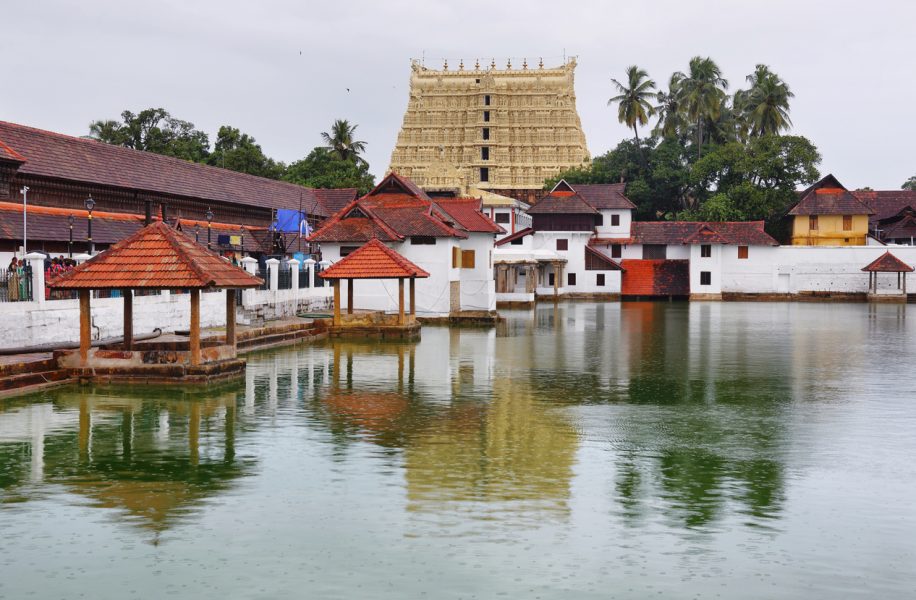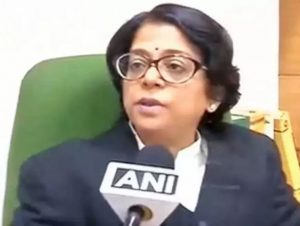
Data debunks Indu Malhotra's ‘Communist takeover of Hindu temples’ remark
Responses to RTI queries, and data presented in the Assembly by both the UDF and LDF regimes reveal that the government doesn't 'use' Hindu temple revenues; on the other hand, several temples are supported by the public exchequer

Retired Supreme Court judge Justice Indu Malhotra’s recent remark, where she accused Communist governments of “taking over” Hindu temples across the country, despite appealing to a section of society, is a theory that has been debunked several times by data.
Malhotra made the statement while talking to a group of people, apparently devotees, outside the Sree Padmanabha Temple on Sunday (August 28) during her visit to Thiruvananthapuram. A video clip of her interaction has gone viral and triggered controversy.
In the clip, one of the devotees praises the retired judge for a sound verdict in the Sree Padmanabha Temple case.
“That is what happens with these communist governments,” Malhotra is heard telling the temple’s visitors in an informal chat. “They want to just take over because of the revenue. Their problem is the revenue. All over they have taken over. All over. Only Hindu temples. So Justice (UU) Lalit and I said — no, we will not allow it.”
Also read: Kerala temple hosts Iftar feast for Muslims, sets communal harmony goals
She further says such activities would have continued if she and Justice Lalit had not prevented it, referring to the 2020 judgment where the Supreme Court had upheld the right of the Travancore royal family to manage the administration of the Padmanabha Swamy Temple.
It may be noted that Malhotra is wearing a mask, and the video recording was not official. The Federal attempted to reach her via phone, text and email, but there was no response.
State not looting: RTI reply
The former Supreme Court judge’s comment has received widespread criticism, with several sections calling her out for allegedly peddling fake narratives concocted by Hindutva outfits in Kerala for more than a decade.
Interestingly, the theory of ‘Hindu temples being looted by communist government’ has been debunked several times by many people with the help of data.
In 2013, the Travancore Devaswom Board replied in detail to an RTI request filed by KC Udayakumar from Ernakulam regarding utilising the revenue of temples under the board. The RTI information provided on November 26, 2012 (of which The Federal has a copy) reveals that contrary to the BJP and Hindutva brigade’s claims against the government, the board actually receives financial aid from the government.
The salaries of the staff of the board are also provided by the public exchequer. The government further provides financial support for the maintenance and renovation of temples listed under the board.

According to the RTI reply, the Travancore Devaswom Board receives the income of all the 1,106 temples under it. The board clarified that the government doesn’t get any share of the income (of around ₹80 lakh per annum) of the temples including the one at Sabarimala.
Social media spat
However, the data wasn’t enough to quell rumours, and a series of debates between BJP leader AN Radhakrishnan and former Congress MLA VT Balram followed, in 2014.
In a Facebook post published on April 22, 2014, Balram, the then Congress MLA, wrote that the Kerala government spent ₹22 crore in disbursing salaries to the staff of the Malabar Devaswom Board in the previous financial year. “The government gives financial aid to Sree Padmanabha Swamy temple (Thiruvananthapuram) every year which has been a practice existing since 1970. This amount is around ₹20 lakh per year. The Sabarimala temple received ₹60 crore in the last three years (2011-2014) as budgetary allocation,” Balram said in his post.
Also read: ‘Brahmins-only’ toilet in Kerala temple creates flutter, probe on
Radhakrishnan, however, accused him of misrepresenting facts and ‘trying to create communal divide by making such statements’ even though he didn’t refute the data presented by the Congress MLA. His allegations, however, rekindled the theory that the government was filling its own coffers with temple revenue and using it for the public instead of the temple.
Data shared in Assembly
The relentless campaign which took the form of communal hatred after a point of time, encouraged the then UDF government to raise the issue in the Assembly.
In 2015, during the tenure of the UDF government, VD Satheeshan, then an MLA and currently the Opposition leader, presented a submission in the Assembly regarding the utilisation of temple revenues in Kerala. The reply to this submission tabled by VS Siva Kumar, then Minister for Devaswom, once again clearly stated that the wealth of Hindu temples was not being ‘grabbed’ by the government.
The reply to the submission presented in the Kerala Assembly on December 7, 2015, stated: “The allegation that the income from various temples, including the Sabarimala temple, is being deposited in the treasury and used for public expense is baseless. The revenue from the temples under the Travancore and Kochi Devaswom boards directly go to the accounts of the respective boards and the income from the temples under the boards such as Malabar Devaswom and Guruvayur Devaswom goes to the bank accounts of the respective temples only.
“The annual auditing of the Travancore and Cochin Devaswom boards is done by the auditors directly appointed by the High Court of Kerala. The auditing of the temples under other Devaswoms is done by the local fund departments in the respective places. All the audit reports are public documents which are available to anyone for scrutiny. The financial activities of the Travancore and Cochin Devaswom boards are monitored by the High Court of Kerala and the boards need the concurrence of the High Court to spend money that goes beyond the prescribed limit.”
The then minister added that the UDF government had spent ₹62 lakh on the security of the Sree Padmanabha Swamy temple alone since it came into power in 2011. That apart, ₹106 crore for the Travancore Devaswom Board, ₹6 crore for Cochin Devaswom Board and ₹60 crore for the Malabar Devaswom board had been spent from the treasury since 2011, he said. In addition to these, the government has spent money from the public exchequer for the renovation of various temples in the state. Altogether, the then UDF government had given ₹231 crore to various Devaswom boards and temples between 2011 and 2015, the minister informed the Assembly.
Continued support
The present LDF government in Kerala continues the tradition of supporting the Devaswom boards and struggling temples. Replying to a question in the Assembly on August 29, 2022, Devaswom Minister K Radhakrishnan gave an elaborate explanation about the government’s support for temples and their staff.
Also read: How a 450-yr-old dance-drama survives as an offering at Kerala’s Guruvayur temple
According to the reply, the government has adopted various programmes to enhance the revenue of the temples, including the online booking for puja and the home delivery of prasada (the divine offering distributed to devotees). The revenue of the Devaswom boards is also used to pay salaries to staff of smaller temples which are struggling for survival.
The minister also said that the previous LDF government had disbursed ₹165 crore to various boards to resolve the COVID-19-induced crisis. As a continuation of this policy, the present government has released ₹20 crore to the Travancore Devaswom and ₹44 lakh to the Malabar Devaswom till July 31, 2022.
‘Gross misunderstanding’
“Indu Malhotra’s comments are unfounded and based on a gross misunderstanding,” K Radhakrishnan, Minister for Devaswom, told The Federal. “Neither the Communist Party nor the LDF government in Kerala has occupied any Hindu temple. The struggles waged by the Communist parties to win the right to worship for all sects of Hinduism are part of history. Left-wing governments, led by CPI(M), have taken steps to protect the worship and beliefs of all sects.”
He added that during the time of the Left governments, measures were taken to reclaim the alienated Devaswom land, pay the temple employees in a systematic manner and convert the people who were once denied entry even into the temple premises into temple employees.
“Repeated campaigns by radical Hindutva forces may have also influenced the retired judge. The government has not taken over the revenue of any temple. On the contrary, the reality is that the government provides necessary financial assistance to run Devaswom Boards,” he said.
As per official data, the state government allocated ₹449 crore to various Devaswom Boards within five years from 2018 to 2022, both with and without budgetary allocation, to run day-to-day operations and pay staff salaries when the floods and Covid created a major crisis.
“The LDF government is currently executing massive development projects like the Sabarimala Masterplan. The retired Justice was trying to mislead people. It is clear from these statements how Indu Malhotra performed as a judge in the Supreme Court,” he said.
WIth the entire data being available in public domain, a former Supreme Court judge reiterating a myth that has been debunked several times has raised eyebrows.

